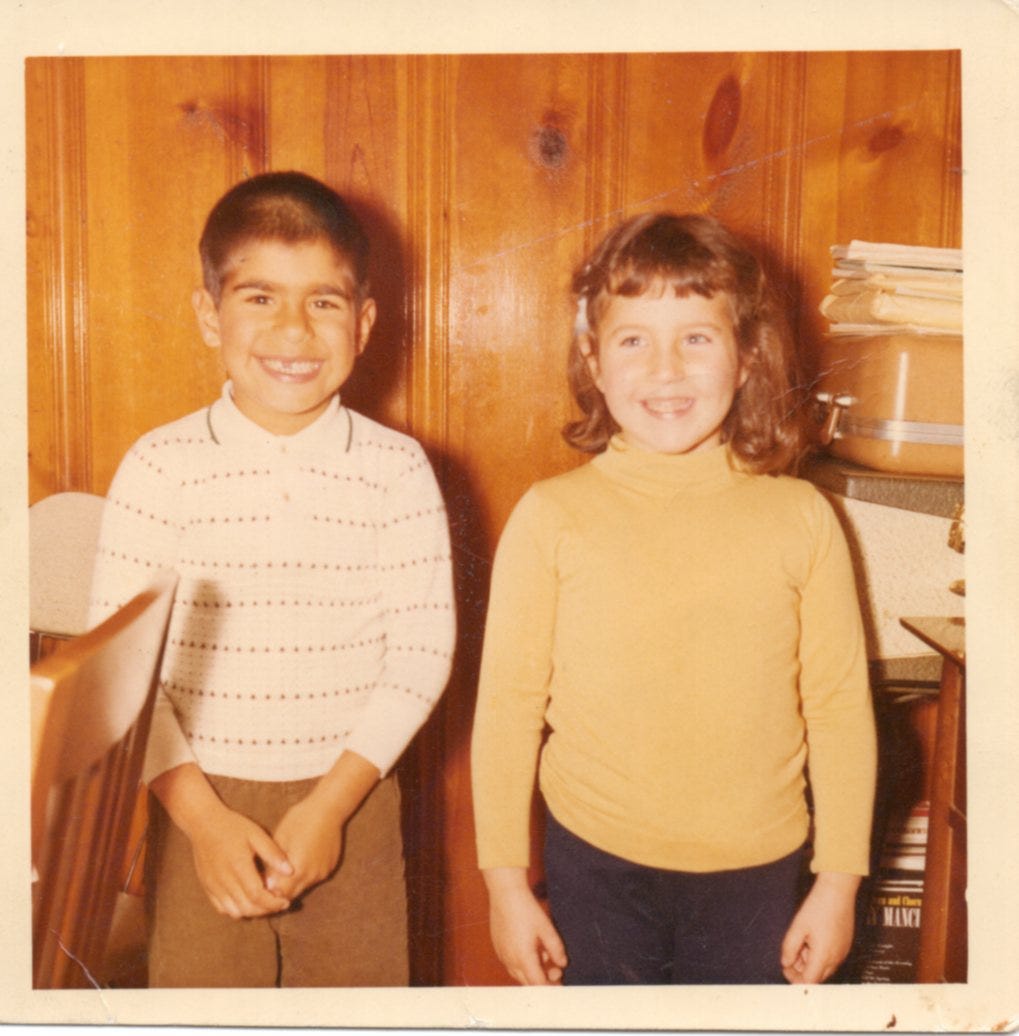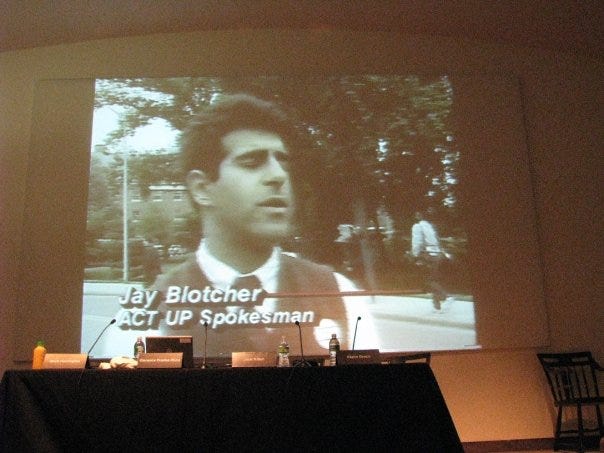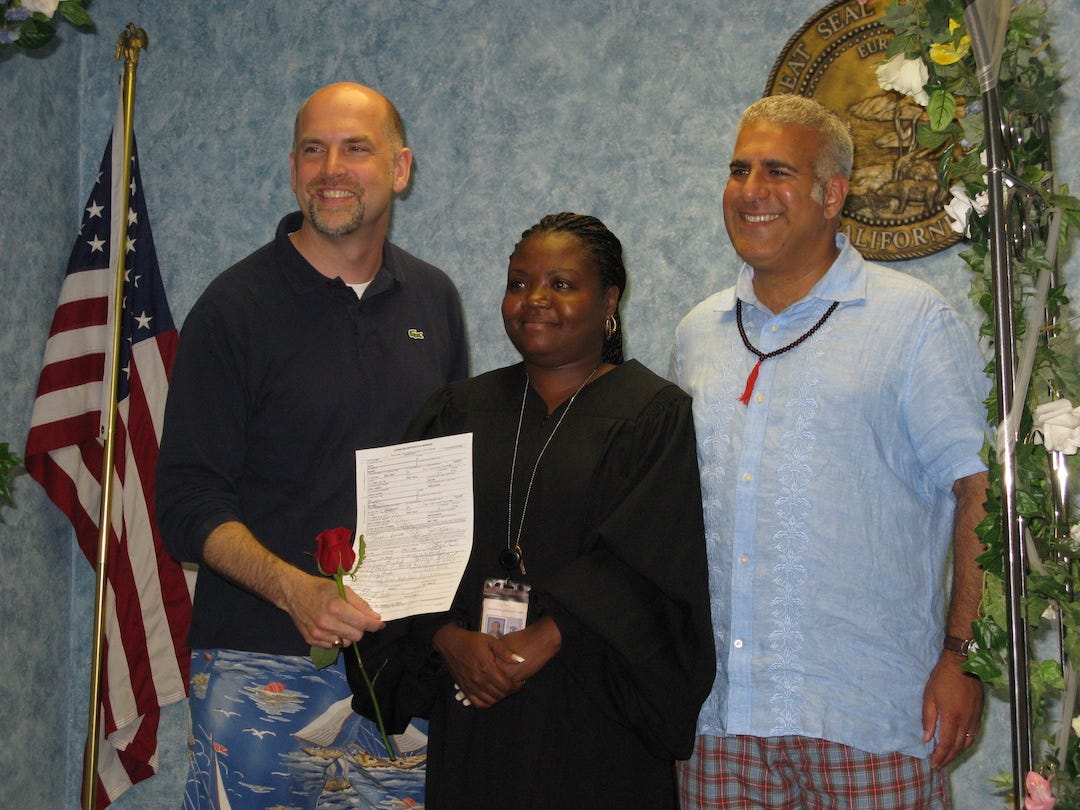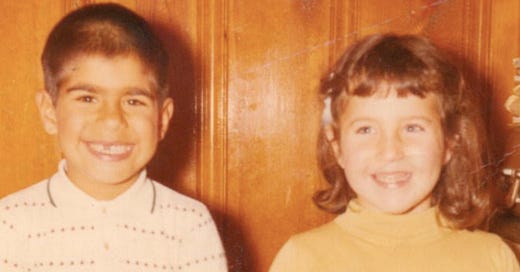Letter to My Younger Self #1: Batman, Robin, and Me.
Jay Blotcher writes to the 5-year-old version of himself with news that it gets better.
This essay is the first in a new Oldster Magazine series, “Letter to My younger Self.”

Dear Jay Bruce Blotcher of Randolph, Massachusetts:
There you are, a kindergartener sitting in your stained-pine-paneled living room in your suburban enclave. It’s a cozy scene on a Wednesday evening in early 1966. Dad is in his favorite chair, puffing on a pipe. Mom is on the couch, inhaling Benson & Hedges. Your little sister Andrea is already in bed.
And despite Mom’s numerous protests, you are sitting too close to the black-and-white TV, two fingers absent-mindedly wedged in your mouth—a workaround for thumb-sucking—and you’re watching another episode of “Batman.”
I know; it’s much easier watching “Batman” than going out and playing in the neighborhood. After all, the kids on Desmond Road and Thayer Circle are too eager to remind you that you are a nerd. You’re also adopted, yet Mom and Dad say that’s something to be proud of.
You are almost six and Batman and Robin are your life.
You insist on sitting practically on top of the boob tube—not only because the proximity allows you to become swept up in the action. But you’re also nearsighted, and a teacher will finally notice in first grade, so you’ll get glasses. Cue jokes about being a “four-eyes.”
I know; it’s much easier watching “Batman” than going out and playing in the neighborhood. After all, the kids on Desmond Road and Thayer Circle are too eager to remind you that you are a nerd. You’re also adopted, yet Mom and Dad say that’s something to be proud of. But you can’t defend the fact that you’re painfully skinny. (Within the year, a tonsillectomy will correct the throat condition that made it hard to eat, turning you chubby.) Even worse, you throw like a girl and have darker skin than everyone else in your slice of white suburbia. (You’ll hear the n-word aimed at you at age 7 at Camp Peter Pan. But when you complain, the camp director will insist, “They’re just jealous of your gorgeous tan.”)
It feels like everyone is against you. But they’re not. Not really. Kids pick up on your fears, your insecurity. If you pretend their taunts don’t bother you, they would knock it off. So ignore them when they call you “blockhead.”
Even worse, you throw like a girl and have darker skin than everyone else in your slice of white suburbia. (You’ll hear the n-word aimed at you at age 7 at Camp Peter Pan. But when you complain, the camp director will insist, “They’re just jealous of your gorgeous tan.”)
To deflect the abuse, you have created a colorful and reassuring world for yourself. You watch Batman and Robin on TV or you play with your Batman cards, assembling the puzzle backs. You also play Batman and Robin with your best pal Larry, that freckle-faced kid. (You play the Boy Wonder and that suits you fine.) It involves wearing bath towels as capes, attached with safety pins from your discarded baby diapers. You jump through the sprinkler on summer days and fight imaginary evildoers.
But pretend criminals are not satisfying, so one afternoon you get Ellen, your kindergarten girlfriend, to play Catwoman. Taking your cue from a scene on a Batman card, you have Catwoman/Ellen tie you to a big log in the woods behind Larry’s house and torture you. (An imaginary buzz saw is involved.) Just as the blade gets close to what you call your “dink,” Batman/Larry swoops in and rescues you. You like Ellen but there is something more comforting about ending up with Larry.
You disappear into your piles of superhero comic books. Protected by these magical talismans, you keep the cruel world at arm’s length.
Everything is “Batman” in your life and though it can be lonely, you prefer it. There are a couple of neighbor friends for trading Batman cards. But when you eat Batman ice cream or buy Batman boots, you’re on your own. You disappear into your piles of superhero comic books. Protected by these magical talismans, you keep the cruel world at arm’s length.

I know that you feel out of step with others. But you’ll soon find an outlet for those feelings. By third grade you will write poems and short stories, craft an upbeat alter-ego named Piggy 9, and create little magazines about teen idols (David Cassidy, Donny Osmond, Bobby Sherman) that you’ll sell on the playground. These antics—complicated by your anti-social ways—will prompt Mom to take you to a therapist. For three years, you’ll finger-paint and play with hand puppets and spill out your frustrations about life in an unfair world. It will be the first time someone really listens as you try to make sense of it all.
But eventually your life will start to cohere.
You will finally figure out why you were glued to the TV, cheering on Batman and Robin. And why you got a greater sense of security when playing with Larry. Hint: It has to do with liking boys.
You know the way Batman battles criminals on a Wednesday night and wins by Thursday night? One day, you will win the fight against kids who make you miserable. By junior high you will be that weird, creative kid. By high school you will bloom, finding friends in Drama Club. By college you will be popular. After graduation, you will move to New York City and make hundreds of friends.
Most importantly, you will finally figure out why you were glued to the TV, cheering on Batman and Robin. And why you got a greater sense of security when playing with Larry. Hint: It has to do with liking boys. You will finally act on those scary, confusing impulses—as early as junior high school. Fumbling about with classmates will answer a lot of yearning questions. It’s the beginning of your greatest journey.
It’s hard to imagine now, but you will find the courage to come out, write for gay magazines, and transform yourself into an activist with ACT UP and Queer Nation in New York City. You will shed the frantic fears and yen for conformity that suburban living demanded. The outcast will find his tribe at last.
It’s hard to imagine now, but you will find the courage to come out, write for gay magazines, and transform yourself into an activist with ACT UP and Queer Nation in New York City.
You will become a crime fighter of sorts—just like the Dynamic Duo of Gotham City. You will learn the virtue of defying authority. As an activist you will call out evildoers in politics and in the corporate world. You will prove that good people can get arrested for taking a stand. And even though your superhero costume is just a “Silence = Death” t-shirt, tight blue jeans and engineer boots, you will inspire others. Along the way, you will be reviled as a troublemaker, a sexual renegade. But you will have grown a thicker skin by then, and will embrace your convictions.

And three decades later, you and your activist comrades—that is, the ones who survived the plague—will finally be honored for your work. You will see a medical breakthrough for AIDS, you will celebrate gay marriage—and then you will see conservatives try to tear down everything you fought for, requiring more battles.
As for the adoption thing, there’s good news: One day in 1988, Valerie Bishop, the woman forced to give you up at birth, will find you. Finally, you will understand who you are and why your skin was the darkest of any white kid in school. (Dad was Puerto Rican.) There is a bitter irony: the kid who could never throw a ball is the biological son of a pitcher for the Baltimore Orioles named Arnie Portocarrero.
While Batman/Larry was a good placeholder for the male bonding you craved, Robin/Jay will eventually find a gentle and wise man named Brook Garrett and later marry him.
And while Batman/Larry was a good placeholder for the male bonding you craved, Robin/Jay will eventually find a gentle and wise man named Brook Garrett and later marry him. Because laws about same-sex marriage are inconsistent, you'll go through four separate ceremonies until you legally tie the knot. All these good things await the nerdy 5-year-old in front of the black-and-white TV.
So, little Jay, enjoy your time with the Caped Crusader and the Boy Wonder. These role models will help you become the person you were destined to be. Of course, these dizzying changes will take much longer than a two-part TV episode. And there’ll be plenty of cliffhangers. But it will all be worth it.
Years from now, Ellen will remain a dear friend. And yes, you’ll still have your Batman cards.
So hang in there.
Love,
Jay at 62






Awww, this is so tender and optimistic and lovely.
I really loved this. It's so well written.